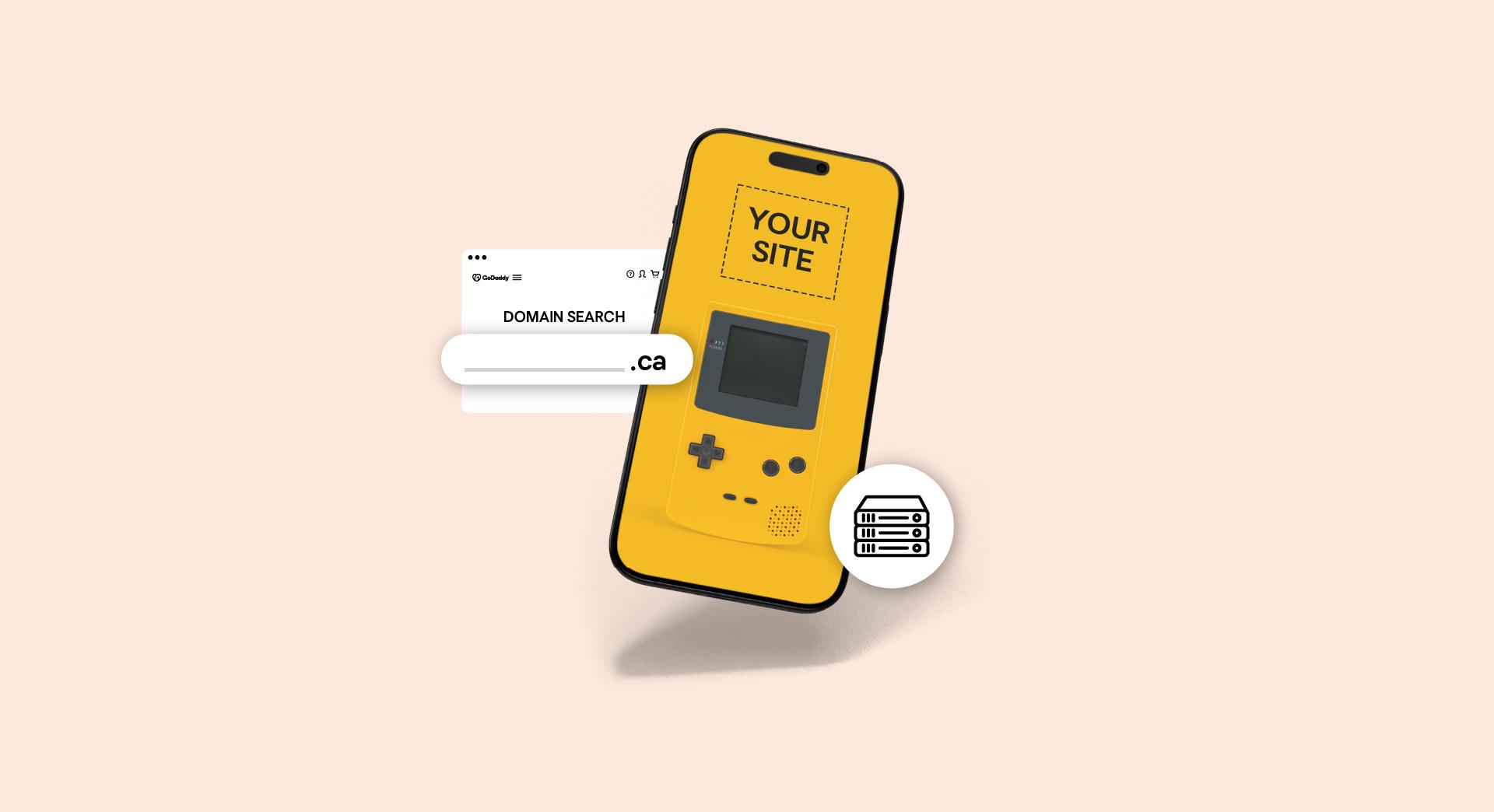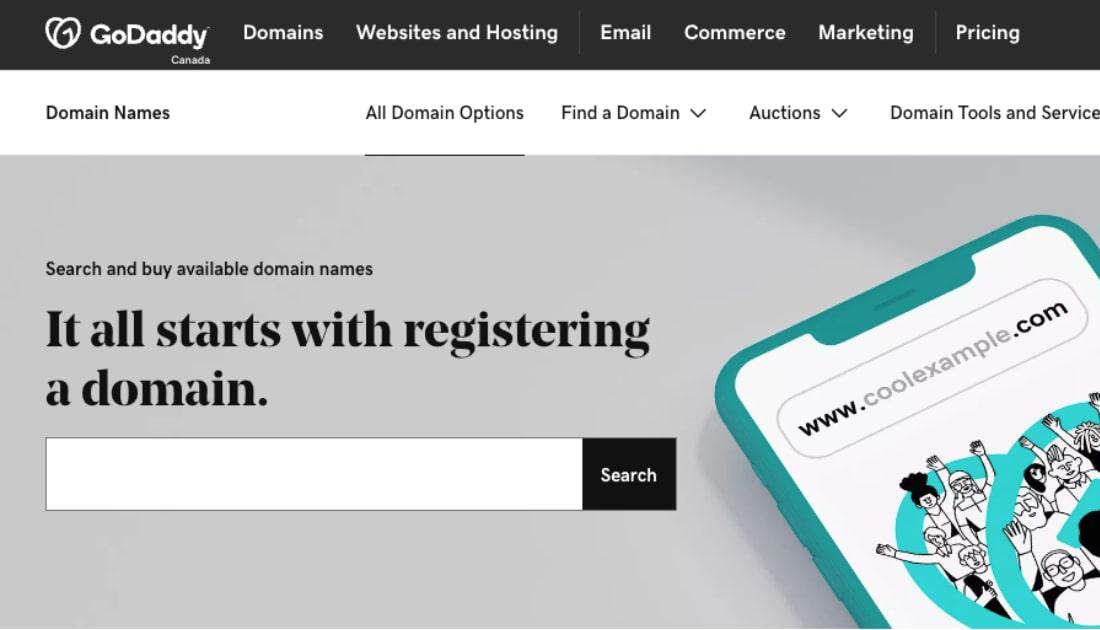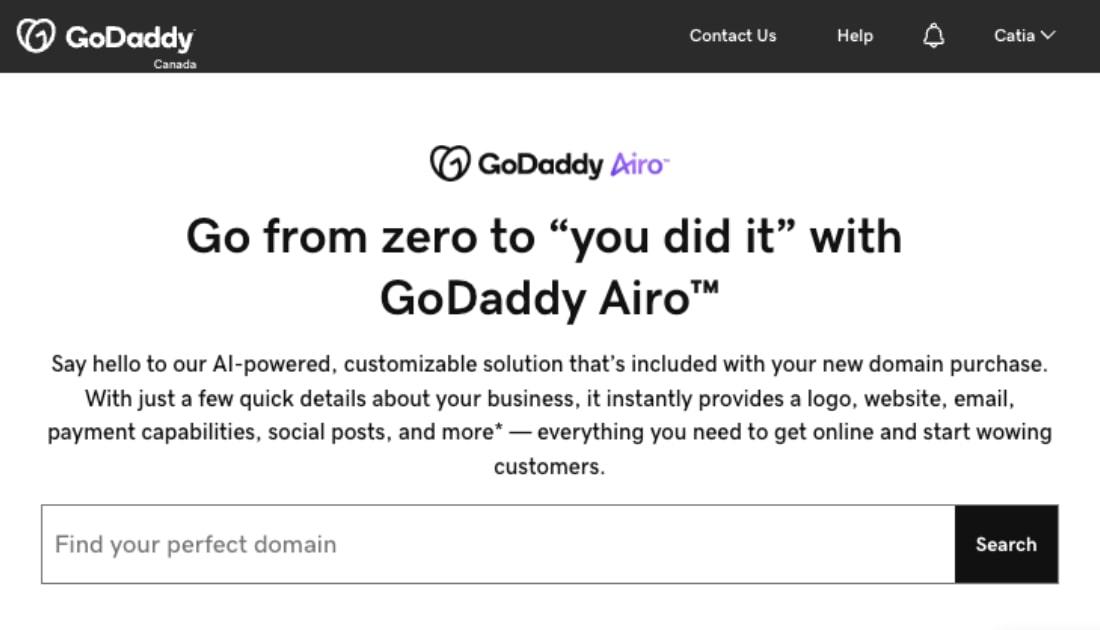Before you begin to establish your business's online presence, you’ll need to understand the difference between a domain name and web hosting.
In this guide, we demystify the difference between the two, answering these common questions as we go:
- What is a domain name?
- What is web hosting?
- How do domain names and web hosting work together?
- What are best practices for managing domain names and web hosting?
But first:
Is it ever the right time to get online?
If you’ve been thinking about getting your business online for a while, you might be waiting for the ‘right’ time.
Yet, the old saying goes that there’s no time like the present.
94% of Canadians are now online, so having an online presence is essential to reaching out to potential clients or helping them reach you.
Having a business website can also bring the following benefits…
- Enhanced credibility: a well-designed on-brand website reflects your professionalism and trustworthiness.
- 24/7 availability: customers can access your site, view your web pages, and contact you, even while you sleep.
- Customer service assistance: by adding FAQs, you can answer customer queries around the clock, improving your customer support.
For more specifics on the technicalities of domains, check out this guide on what is a domain name.
Editor’s note: Just want to jump straight to launching a site? Get your domain name through GoDaddy and you’ll get access to the AI-fuelled Airo experience, which can help you create a logo and launch a simple website – for free – in a matter of minutes – literally.
Domain vs. hosting: definition and difference
Web hosting services provide the infrastructure - think hosting servers and physical servers - that store your website files, including images, videos, and text. This is the digital “land” your site lives on.
When you buy a web hosting plan from a hosting provider like GoDaddy, you’re essentially renting space on a web server. Your website content lives there, making it accessible to anyone online.

Meanwhile, your domain name is like your website’s street address.
Imagine telling people to visit your business: you’d give them your street address, not the GPS coordinates (a string of numbers). Similarly, your domain name is the easy-to-remember website address that points to your site.
Hosting companies provide the technical muscle to keep your site running, while your domain name guides visitors to your site in their web browser by resolving your domain to the correct IP address using the Domain Name System (DNS). Together, they make your website accessible and user-friendly.
Which do I need for my website — a domain name or hosting?
You need both a domain name and website hosting. Without hosting, your site has nowhere to “live.” Without a domain name, nobody can find it.
While some website builder platforms offer a free subdomain (e.g., YourBusinessName.godaddysites.com), your own custom domain name is best for branding and SEO.
You can change your primary domain name at any time. See the FAQs below for more on this.
Do I have to buy my domain name and hosting together?
No, you don’t have to buy them together—or even from the same company.
For example, many people register their domain name as soon as they’ve settled on a business name. This is a smart move, as this allows them to nail down their business identity before someone else registers the domain name they want.

Once they have their domain name, they can use it to create a custom email address that makes them look like a professional. This can help convince potential clients that you’re actually a real business.
Since many people start their businesses on social media first, it may be some time before they build a website and need hosting.
However, buying both from the same web hosting provider can save you money and simplify management.
Many providers offer hosting packages that include a free domain name for the first year. This streamlines billing and setup, letting you focus on optimizing your site and building your brand.
What is a domain name?
A domain name is the address people use to visit your website. It’s a human-friendly alias for your website’s IP address (which is just a string of numbers). For example, “yourbusiness.ca” is easier to remember than “192.168.1.1”.
The Domain Name System (DNS) connects your domain name to your web hosting account’s IP address, so visitors see your site’s website content when they type your domain in their browser’s address bar.

What are the different types of domain names?
The part after the dot in your domain is called the domain extension or top-level domain (TLD). The most popular TLD is .com, but there are many:
- Generic top-level domains (gTLDs): .com, .org, .net
- Country code top-level domains (ccTLDs): .ca (Canada), .uk (United Kingdom)
- Specialty TLDs: .shop, .quebec, .blog, and many more
Your domain name registrar will help you search for available options. Some country code top-level domains have eligibility requirements (e.g., .ca domains require a Canadian presence).
If you want to buy a domain name in Canada, for example, you'll have to live or have a business located there. Strict Canadian presence requirements mean that only real Canadian people and organizations can access and register .ca domains.
Can I change my website’s domain name?
Yes, you can change your website’s domain name by purchasing a new domain and updating your DNS settings to point to your hosting provider.
However, it’s not a decision to be taken lightly, as changing your domain may hurt your brand awareness and search rankings. This could reduce traffic and backlinks to your website.
To change your website’s domain, you simply register a domain name you would like to use as the primary web address for your site, then forward it to your website. See how easy it is here.
How to choose a domain name
Most people choose a domain name that matches their company name or one that aligns closely with it.
Your domain needs to be memorable but different from any other domain owned on the internet. Check out this post (three-minute read) for 10 tips on choosing a great domain name.
Domain names are like snowflakes: no two are alike.
This means you may have to get creative if your company name is a common name or word someone else has already used. Once a particular domain is registered to a person or business, no one else can use it.
Tip: Most domain providers have a domain generator tool on their websites to help you come up with catchy ideas.
Check to see if the domain you want is available now
What to do if your domain name is taken
You can find the domain owners details using the WHOIS lookup tool and contact them. You can also consider different endings to the domain names you’re thinking of with a domain extension.
Related: Check out this post on how to get the best web name.
For example, you may see many websites with .com at the end of the domain, but alternatives for these domain extensions exist such as:
There are many other extensions to consider adding to your domain name, which can help expand your options if the .com you had in mind is already taken.
Scroll through the complete list — including industry-specific extensions like .ag, realestate and finance — here.
How your domain name impacts your business branding
A domain name also contributes to brand recognition simply by triggering a response in people when they read it.
When you see cbc.ca is there any doubt in your mind what you'll find on that website?
Imagine the difference between using your company name as a domain and opting for one that sounds more like “supercheapproducts.com.”
Which do you think would be more easily trusted by a customer? If ecommerce is your goal, would a customer want to purchase from your website? All these questions must be considered when choosing your domain name.
What is web hosting?

Web hosting is a service that allows you to rent space on a server.
Think of your website as a collection of digital files — information, photos, videos and design elements. You need a secure digital space to store all those files so that people the world over can browse your site any time of the day or night.
Without web hosting, you are the only one who could ever see your website.
As long as you pay your hosting provider, your website will have a place to live online — along with your collection of files.
Tip: Many do-it-yourself website tools — including GoDaddy’s Airo — come with hosting built in. You don’t even need to think about it. TechRadar Pro calls Airo a "game-changer for small businesses."
What are the different types of web hosting?
Types of web hosting include:
- Shared hosting: Affordable, multiple websites share a server. Great for small business websites or blogs.
- VPS hosting: A Virtual Private Server (VPS) gives you dedicated resources on a shared server. Ideal for growing sites needing more control.
- Dedicated hosting: Your website gets its own physical server. Best for high-traffic sites and enterprise needs.
- Cloud hosting: Scalable resources for reliability and flexibility.
- WordPress hosting: Optimized for WordPress websites, with features like one-click installs and enhanced security.
- Email hosting: Some hosting providers offer custom email accounts as part of their packages.
Related: What is web hosting? Complete guide for beginners
What to look for in hosting
These are the hosting basics all websites need from the start:
- Storage: For most small- to medium-sized business sites, a few gigabytes of storage is sufficient.
- Bandwidth: People with large sites who expect to attract a large number of visitors require more bandwidth.
- Scalability: The option of an automatic increase in storage/bandwidth in case of a large traffic spike on your site.
- Reliability: Look for a 99.9% uptime guarantee or better. A website that’s down is useless.
- Security: If the hosting provider doesn’t list malware/virus protection as a feature, ask about it.
- Backups: Some providers run scheduled backups of your content and store them on the hosting plan for you.
- 24/7 technical support, so you can call for help no matter what the hour.
Features you might need down the road include:
- Speed tools for optimizing your site for mobile devices.
- Analytics tools for gathering information about your marketing efforts and your users.
- Tools that allow you to integrate your website with your social media pages.
You might be able to move your website over to a new hosting service later on, but it helps to have access to these features from the beginning.
How do domain names and web hosting work together?
Knowing the difference between domain names and hosting is where many people get confused, but it isn’t complicated.
- Think of your domain as a street address, guiding people to where your website lives online.
- Hosting is like the lot where the building they’re looking for sits.
Hosting allows you to store the files that make up your site at that location (aka your domain name), so visitors have something to see.
You can purchase both from the same company or separately from different providers. If you buy them individually, you’ll just need to be sure to point your domain name to your selected web host — you or your web company can do this by editing the Domain Name System (DNS) settings.
Best practices for managing domain names and web hosting
If there’s one thing to know about running a small business, it’s that change is expected. Once you get everything set up, you might still have questions about managing your domain name and hosting over time.
Let’s look at a few best practices to keep things running smoothly for your domain and hosting setup.
But first, always review the fine print.
You’ll need to abide by any waiting periods before moving or transferring any domains between domain or hosting providers.

It’s easier to use one company for both
If you’re new to domains and hosting, consider purchasing them together for the easiest transition. Setting up with one provider can feel more streamlined, since everything is with one company.
As a bonus, you’ll only have one account to keep track of and one company to send payments to.
You can switch domain providers whenever you like
You can always move your domain name to another company if you choose to. If the domain is registered to you, you can do what you like with it.
Why would you want to move a domain? All kinds of reasons. One common motivator might be to move the domains you’ve purchased over time, so that all your domains are managed by one provider.
You can change web hosts without changing your domain name
You can change web hosts for any domains you own if you want to. You’d simply need to edit the DNS settings to point to the new hosting company.
Again, sometimes these changes happen over time as you organize your domains and work to streamline billing or renewal processes.
Final thoughts: the difference between a domain name and hosting
Launching a new company website or online shop is important for promoting your company and reaching potential customers. If you’ve got a new idea for a business, setting up a website should be one of the first items on your list.
With small businesses making up 99.8% of businesses in the country, it’s worthwhile to dive in and get started now.
So now that you have a better understanding of how your domain name and hosting work together, you have the upper hand in online visibility. Use this knowledge to help potential customers find your online shop and enjoy the website you’ve created to promote your business.
Remember, both are important at helping you reach the audiences you’ll need to grow. Working with a trusted domain and hosting provider can help safeguard your business website, ensuring your customers can always find you online.
Editor's Note: New GoDaddy domains now come with GoDaddy Airo - our AI-powered solution that creates a free website, logo, email and more for your new online venture.
Frequently asked questions
Still have questions about how domains differ from web hosting? The answers may be here.
Do I need a domain name for hosting?
Technically no, you can host a website without a domain name, but in practically you do need one. Without a domain name, visitors would need to use a complicated string of numbers to find your website.
Many companies will give you subdomain name for free when you create a website with them. While this is cheaper and easier for you, it’s not ideal for anyone who plans to grow a business.
For example, a subdomain for a site built with GoDaddy might be YourBusinessName.godaddysites.com.
As a rule, it is much better to have your own domain name, rather than one tacked onto the domain name of another business.
Is GoDaddy a domain name or hosting provider?
GoDaddy is both a domain name registrar and a web hosting provider, offering domain name registration, web hosting plans, SSL certificates, WordPress hosting, and more.
Can you host a website without a domain name?
In theory, yes—you can use an IP address (a string of numbers), but a domain name is essential for usability and SEO.
Is a domain name the same as a website?
No. A domain name is your site’s address, while your website consists of web pages and website content hosted on a server.
Is web hosting the same as domain name?
No. Web hosting is the service that stores your website files; a domain name is the address people type to visit your site.
Does web hosting ever include a domain name?
Yes, some web hosting plans include a domain name. For example, GoDaddy’s lowest-price shared hosting plans come with a free domain name (C$14.99/yr value), free SSL certificate for security (one year) and free WordPress migration tool.
What is a domain name?
A domain name is the address that people use to visit a website. Domain names consist of several components, include domain extensions (the part that comes after the dot). Every domain name ends in a Top-Level Domain (TLD).
What is a web hosting service?
Web hosting services provides online storage space for a website's files, making it accessible and viewable on the internet. Without hosting, no one but you would ever see your website.
What is a domain registrar?
A domain registrar is a business certified by ICAAN to sell domain names. Domain name sellers like GoDaddy use an AI tool to help you search for your preferred domain name. If that exact domain name is not available, it will suggest similar domain names that are available.
How much does it really cost to build a WordPress website?
Depending on your needs, your cost to start a WordPress website can range from less than C$100 to several thousand dollars. It depends on the size and complexity of the website, and whether you want to design custom pages or use existing templates.
What about domain hosting?
Paying a domain name service provider for a domain name is not expensive. For example, a .ca domain from GoDaddy costs around C$5 to $20 to register for one year
Can I use the same company for both domain registration and web hosting?
Yes, and it simplifies management, billing, and customer support.
What is the difference between a domain name and web hosting?
A domain name is the address people use to visiting your website. Web hosting stores your website and serves it up to people who type your domain name into their browser or click on an ad.
How do I transfer a domain name to a new host?
Unlock your domain, get the transfer code from your current domain registrar, and initiate the domain transfer with your new service provider.
Paul Teitelman and Adam Turner contributed to this article.









